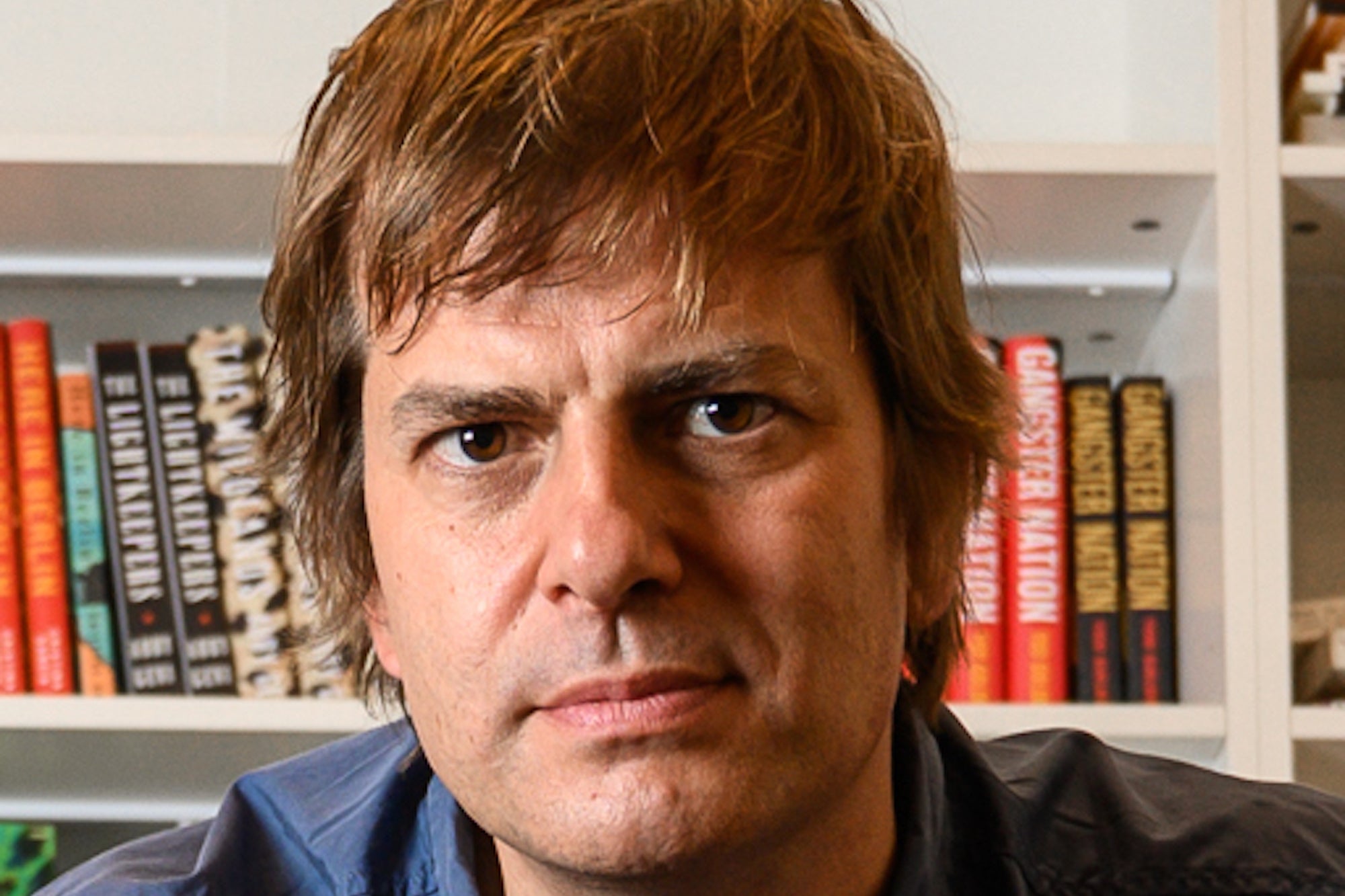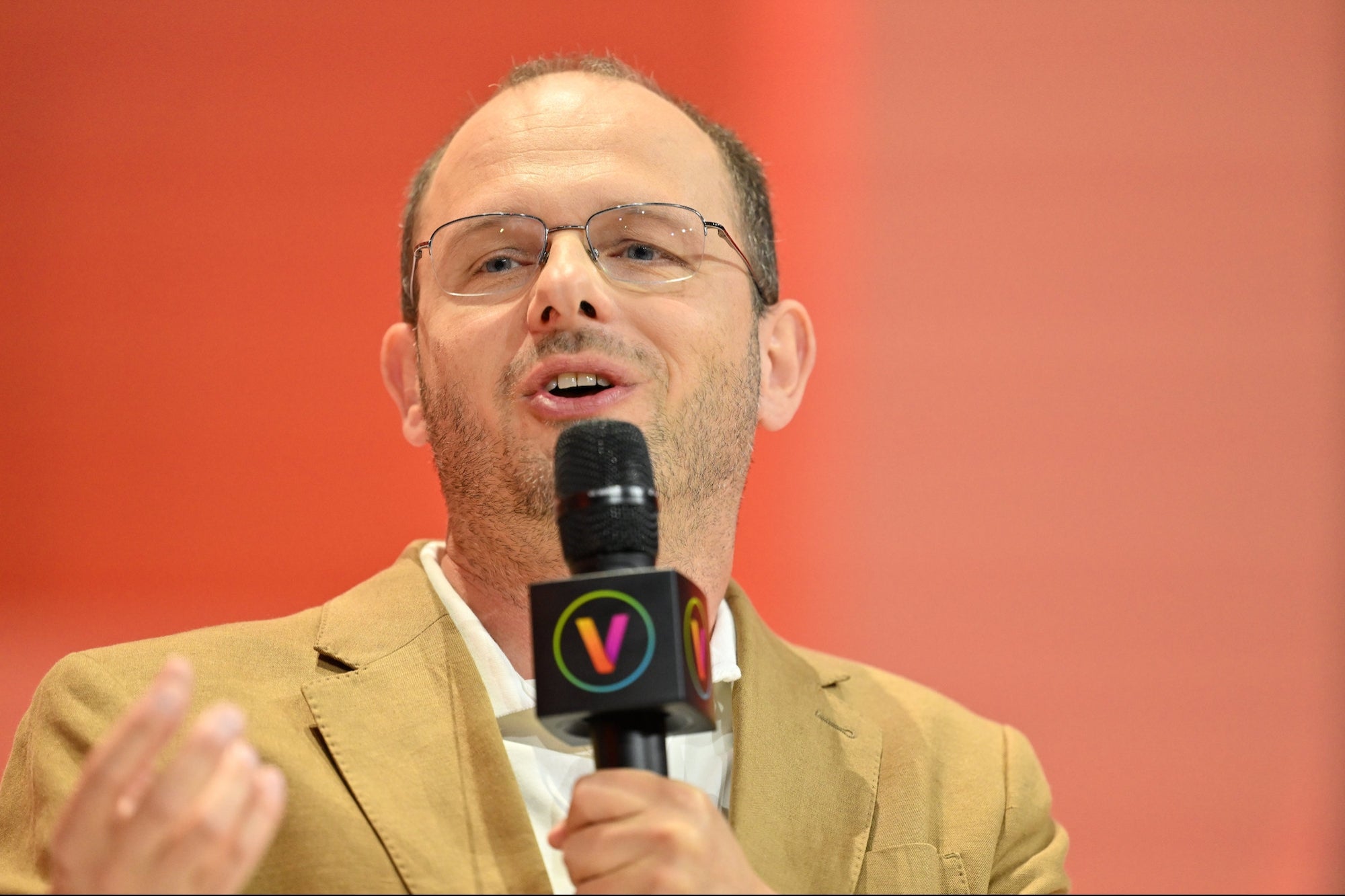When Andy Hunter, founder and CEO of Bookshop.org, followed his lifelong passion for books into the publishing industry in 2009, he noticed an unsettling shift: The bookstores that had defined his childhood and communities were going out of business — rapidly losing market share to Amazon.
 Image Credit: Courtesy of Bookshop.org. Andy Hunter.
Image Credit: Courtesy of Bookshop.org. Andy Hunter.
The number of U.S. bookstores decreased more than 50% in the span of about two decades, falling from 12,151 in 1998 to 6,045 in 2019, according to data from the Census Bureau’s County Business Patterns.
Jeff Bezos founded Amazon, which initially focused on selling books online, in July 1995. Today, book sales make up roughly 10% of Amazon’s profit at an estimated $28 billion; in 2020, the House Judiciary Committee found that the ecommerce giant controlled over 50% of the total print book market and more than 80% of the ebook market.
Related: Why Purpose-Driven Marketplaces Are the Antidote to Amazon
“Bookstores are advocates and activists for the importance of reading in all their communities.”
Amid Amazon and ecommerce’s quick, concurrent growth, Hunter realized that bookstores were “facing an extinction event.”
“It is really like the environment, where you can have coral reefs, and when the coral reefs die, then everything is hosed,” Hunter explains. “Bookstores are advocates and activists for the importance of reading in all their communities. As those start to die out, the importance of books in our culture also starts to recede.”
Hunter built his career in publishing for more than a decade, during which he co-founded literary websites Electric Literature and Literary Hub and the independent publisher Catapult.
Related: 5 Books Every Small Business Owner Should Read
Over the years, Hunter waited for someone to acknowledge what was happening to the nation’s bookstores, for “some champion to come along” and save them. Then, at a dinner in 2018, Hunter sat next to a member of the American Booksellers Association’s board of directors who pointed out that Hunter had internet expertise — could he help with the organization’s online sales strategy?
That’s when Hunter came up with the idea for Bookshop, the online book seller that funnels profits back to independent bookstores across the country. If shoppers choose a specific local store to support, that small business receives 100% of the sales profit; otherwise, 33% of the profit is distributed among all of the bookstores on the platform.
“Fortunately, it did succeed — and it actually succeeded beyond our wildest dreams.”
“ It was kind of a Hail Mary,” Hunter recalls. “At the time, I was like, Well, this almost certainly won’t succeed because I’ve never done anything like this before, and the odds are completely against us. Nobody wanted to invest in it. But nothing is going to get better if you don’t do anything about it, so at least [we were] going to try to do something about it. And, fortunately, it did succeed — and it actually succeeded beyond our wildest dreams.”
Bookshop launched in January 2020, and in the early days, the “very small, very scrappy” startup didn’t have a customer service team and saw modest sales. That changed when the pandemic hit about eight weeks later. Hunter says that Bookshop’s daily sales grew from $10,000 to $50,000 to $150,000 in short order. In the same period, the number of bookstores on the platform increased from 250 to more than 1,500.
Related: Why Your Business Should Be a Benefit Corporation, or B Corp
Now, Bookshop is a certified B Corp that has raised more than $39 million for independent bookstores to date.
“Our profit is not huge because if our profit is huge, then it’s off of our mission.”
The startup’s explosive growth began to wane in 2022, as customers returned to buy in-person at their local bookstores, Hunter says. Bookshop was profitable in 2020 and 2021, then lost money every year through 2024.
”This year, we’re profitable again,” Hunter says, “but we’re really lean. Our expenses are less than 13% of our total sales. We have something like $1.5 million of revenue per employee. We stay super lean because we are trying to always give the maximum amount to the bookstores. Even when we are profitable, our profit is not huge because if our profit is huge, then it’s off of our mission [to] support local bookstores.”
Earlier this year, Bookshop tackled its next frontier: ebooks. The goal was to build a “really easy to use” application that would function across devices in the U.S. and other countries, Hunter says. The initiative, launched in January, has been a challenge for the small company, which lacks the substantial financial backing of competitors. Digital reading subscription service Scribd has raised more than $100 million; Bookshop raised $2.3 million to support its ebook platform.
Related: Why (and How) Amazon Created the Kindle and Changed the Book Industry Forever
“ So we’re talking about a platform that has competitors that are 50 times better funded,” Hunter says, “and that doesn’t even go into Amazon and how much money Amazon has spent on the Kindle. So we are a scrappy, ragtag band of hopefully talented enough people to be able to pull us off.”
Additionally, because Bookshop gives so much of its profit to independent bookstores, it doesn’t have a large digital marketing budget. Bookshop spends about 2% of its revenue on advertisements and marketing. In contrast to the direct-to-consumer brands that saw major growth during the pandemic and spend 15% to 30% of their topline revenue on digital marketing, Bookshop relies heavily on word-of-mouth and referrals, Hunter says.
So far, Bookshop’s word-of-mouth marketing strategy is paying off: The company is about a year ahead of its projections for ebook sales, which already make up 5% of total sales.
“For us, winning is, we got 5% of Amazon customers to switch to independent bookstores.”
Of course, getting Bookshop’s ebooks on Amazon’s Kindle devices could bring even more significant growth. Although the Kindle supports some third-party applications like the library reading app Libby, ebooks from other platforms, including Scribd, aren’t available on the device. Access requires Amazon’s permission, and the request letter that Hunter sent to the company about four months ago has yet to receive a reply.
Bookshop is doing roughly three times the total independent online bookstore sales in 2019, Hunter says — and he’s determined to grow that number.
“ Amazon is really powerful and has tons of resources,” Hunter says. “They’ve got Prime and a lot of ways to lock in customers. So we try to be realistic, but for us, winning is not beating Amazon. For us, winning is, we got 5% of Amazon customers to switch to independent bookstores — that would be a huge lifeline for independent bookstores.”
Related: A Beloved 130-Year-Old Small Business in California Is Seeking a New Owner — and It Won’t Sell to the Highest Bidder: ‘Everybody’s Talking About It’
The good news is that independent bookstores appear to be making a comeback.
“ For the past five years, every single year, more bookstores have opened than closed,” Hunter says. “And there are now, from a low of about 1,900 independent bookstores in the American Booksellers Association in 2019, about 2,800 independent bookstores in the American Booksellers Association.”
The American Booksellers Association, which advocates for independent bookstores, reported 2,433 bookstore companies in 2,844 store locations in 2024, an 11% increase in membership year over year. Bookshop currently hosts more than 2,200 independent stores on its platform.
“The cost is ultimately what kind of society we’re creating.”
Hunter encourages everyone to consider the future they want for themselves and the next generation — and how the small decisions we make every day will shape it.
“Convenience has a cost that isn’t apparent to everybody at the face, and the cost is ultimately what kind of society we’re creating,” Hunter says. “[People should] make the effort of making good choices because they’re going to be living in the world that those choices created.”








